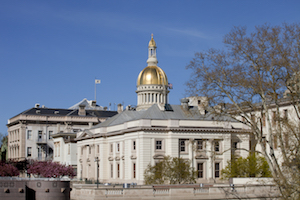 Witnesses testifying at a hearing before the New Jersey state legislature voiced strong opposition to a proposed financial transaction tax that would impact retirement plans.
Witnesses testifying at a hearing before the New Jersey state legislature voiced strong opposition to a proposed financial transaction tax that would impact retirement plans.
At the Oct. 19 hearing held by the New Jersey Assembly Financial Institutions and Insurance Committee, 17 organizations testified in opposition to the proposed financial transaction tax, while no witnesses testified in favor of it.
During the hearing, Committee chairman John McKeon (D-Essex), who originally introduced the bill, proposed to reduce the tax to $.0001 per transaction and to limit it to two years. As originally proposed in July, the bill (A4402) would impose a tax on high-quantity processors of financial transactions at $0.0025 per transaction.
“I’m asking this industry to be part of a solution in what’s the most difficult time,” McKeon (D-Essex) stated. “If they [the financial services industry] don’t concede this is a significant, extraordinary compromise on our part as to where the bill has traveled to, then they’d be disingenuous,” the chairman further stated. McKeon also suggested that the proposed tax would raise $1 billion over two years and would only cost $1.30 annually for an individual investor.
That did not satisfy the witnesses who testified during the virtual hearing. The NYSE and NASDAQ, both of which have financial data centers in New Jersey, threatened to leave the state if the proposal moves forward, contending that they have a fiduciary responsibility to do so. “The imposition of a tax on transactions processed in New Jersey would incentivize trading volume to move immediately and precipitously to a venue located in a state where the tax does not apply,” noted Hope Jarkowski, co-head of government affairs for NYSE parent Intercontinental Exchange Inc.
Retirement Impact
“Many retirement accounts such as pension funds, 401(k)s and IRAs as well as 529s are invested in target date funds, which have embedded asset allocation,” according to the testimony by the Securities Industry and Financial Markets Association (SIFMA). “If an FTT were to be imposed, these investments would be charged with the tax whenever they are rebalanced, or the asset mix is changed, which would ultimately be passed along to the savers and investors.”
Kirsten Wegner, CEO of Modern Markets Initiative, pointed to a recent study the organization released showing that the state’s FTT could cost individual investors and 401(k) plan holders up to more than $8 billion after 40 years, depending on the level of the tax.
Moreover, SIFMA noted that in jurisdictions where an FTT has been implemented, it has never raised the expected revenue, and has resulted in a migration of trading volume to other jurisdictions which have not imposed an FTT. “With specific regard to the New Jersey S2902/A4402 proposal, SIFMA would note that securities firms must adhere to FINRA’s ‘best execution’ rule which requires broker-dealers to find the most favorable price for customers when buying and selling securities,” a representative from the organization explained. “Faced with an FTT, these firms are likely to gravitate towards alternate trading platforms in other states to offer a better price for their clients.”
Similarly, James Angel, a finance professor from Georgetown University, emphasized how other jurisdictions have tried to impose these financial transaction taxes in the past and they have all failed. “They’re not kidding when they [NYSE and NASDAQ] say they’ll move out of state,” stated Angel, who added that “there are plenty of places that would love to have stock exchange data centers.” He further noted that it would be a “net revenue loser for the state of New Jersey.”
While the committee did not vote on the bill, two Democrats on the committee (Roy Freiman, D-Somerset and Yvonne Lopez, D-Middlesex) and one Republican (Betty Lou DeCroce, R-26), stated that they would not support the measure. Freiman said that he believed there’s some legitimacy to the threat that the exchanges would leave and the estimated revenue wouldn’t materialize. Lopez suggested that the state may be overstepping its bounds after increasing the corporate business tax and the tax rate on income of more than $1 million. “I’m just not at a good place with this legislation,” she said.
New Jersey Gov. Phil Murphy (D) and the leaders of the state’s Democratic-controlled legislature have previously spoken in favor of the legislation and believe it’s still a possibility.

